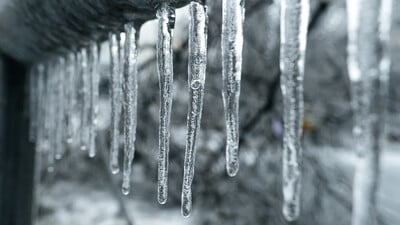Winter can be a tough season for water supply and drainage systems. Freezing temperatures, heavy rain and snowmelt can all take their toll, leading to costly damage and inconvenience. Let’s explore the common challenges faced during a cold snap and how to keep your systems running smoothly.
The Challenges of Winter for Water Supply and Drains
Frozen Pipes in Uninsulated Areas
Pipes in unheated or poorly insulated spaces such as lofts, garages or external walls are particularly vulnerable to freezing. When water freezes it expands, which can lead to pipe bursts and significant water damage.
Clogged Gutters and Drains
Autumn leaf-fall often leaves gutters, channel drains and gully traps clogged. When winter arrives, these blockages can freeze, exacerbating drainage issues and causing water to back up into your property.
Heavy Rainfall and Snowmelt
Winter rainstorms and melting snow can overwhelm drainage systems, especially if they are already partially blocked. This can result in localised flooding and water ingress into homes and businesses.
Ice and Structural Damage
Ice can form in drains and pipework, creating blockages that prevent water flow. Prolonged heavy frost can also weaken or crack pipes, leading to leaks or bursts.
How to Prevent Winter Woes
Insulate Exposed Pipes
Wrap exposed pipes in foam insulation sleeves or use heat tape to keep them from freezing. Pay particular attention to pipes in loft spaces, basements and external walls.
Clear Gutters and Drains
Ensure gutters, downspouts and external drains are clear of leaves and debris before winter sets in. Regular maintenance can prevent blockages and flooding.
Install Gully Covers
Gully covers can help keep debris out of drains, reducing the risk of blockages. They’re a simple and effective way to protect your drainage system.
Monitor for Leaks
Check for leaks or drips in your plumbing and drainage systems. Even small issues can worsen in freezing conditions, so it’s best to address them promptly.
Use a Frost Thermostat
A frost thermostat can help prevent freezing by activating heating systems when temperatures drop below a set level. This is particularly useful for unoccupied or intermittently used properties.
What to Do If Problems Arise
Frozen Pipes
Turn Off the Water Supply: Shut off the main water valve to prevent further damage.
Thaw Pipes Gently: Use a hairdryer or warm towels to thaw frozen sections. Avoid open flames or high heat, which can damage pipes.
Call a Professional: If you suspect a burst pipe, contact a plumber immediately.
Blocked Drains
Remove Surface Debris: Clear leaves, ice, and debris from drain covers.
Use Hot Water: Pour hot (not boiling) water down the drain to help melt ice and clear blockages.
Use a Drain Snake: For persistent blockages, a drain snake can help remove obstructions.
Hire the Professionals: Attempting to clear badly blocked drains can cause expensive damage. Professional drain-clearing companies have the right equipment and expertise to get your drains working again quickly and safely – they could be the cheaper option!
Flooding
Protect Your Property: Use sandbags or barriers to prevent water from entering your home.
Pump Out Water: Use a wet/dry vacuum or submersible pump to remove standing water.
Seek Professional Help: For severe flooding, contact a flood remediation specialist. They have the equipment and skills needed to quickly remove floodwater, dry out the fabric of your building and in some cases, save your furniture and floor coverings.

Written by
Vicki James
Sales & Marketing Coordinator
Vicki is a vital part of the marketing team; from reporting to copywriting, she ensures we complete projects on time.

